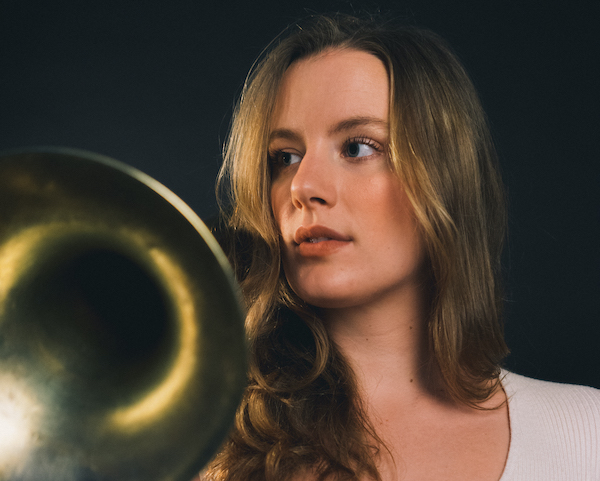Jan 13, 2026 2:09 PM
More Trump-Kennedy Center Cancellations
The fallout from the renaming of the John F. Kennedy Center for the Performing Arts to include President Donald…

Trombonist Mariel Bildsten aims to replicate epic big-band moments in her small ensemble arrangements.
(Photo: Courtesy Outside In)Trombonist Mariel Bildsten began developing ideas for her debut album in 2019, aiming to reflect different dimensions of her artistry, particularly her skills as an arranger. “I’m not super interested in just playing tunes for the tune’s sake,” said Bildsten, referencing the impetus for crafting Backbone (Outside In).
The New York-based trombonist left Santa Barbara nearly a decade ago to study at The New School. She quickly was captivated by the big band scene’s creative repertoire and lush orchestration, and began playing regularly with leaders Arturo O’Farrill, Eyal Vilner and drummer Evan Sherman, who co-produced Backbone with her. Bildsten’s vision for the album included replicating what she considers those “grand moments” in Duke Ellington’s and Count Basie’s big-band arrangements—but orchestrated for quintet.
“Arranging has been an important part of bringing together how I think about music,” Bildsten said, “how these moments ascend or descend into something else, thinking about them as transitional points to get into the melodies of these songs.”
Backbone showcases the quintet’s irrepressible spontaneity. The program, which includes Ellington’s “Mood Indigo,” provides plenty of opportunities for the players to simmer and cook, as Bildsten does alongside bassist Ben Wolfe on Harold Arlen’s “The Man That Got Away.” Other repertoire selections, and their subsequent arrangements, emerged from the hang.
When Bildsten first heard the late trumpeter Roy Hargrove play “The Lamp Is Low” after hours at Smalls, she didn’t recognize it. But she was struck by the song’s lingering beauty. So, she did what she’d always do when Hargrove was around: She listened and observed.
“After they played it, [Hargrove] sat down with a young pianist and taught them the changes,” Bildsten recalled. “That’s what he did, night after night. It was just such an amazing experience to be around him—interact with him, hear him play and [get] feedback. He was so real in his approach and he really brought people together.”
Bildsten’s quintet recorded Backbone in one night, between 6 p.m. and 2 a.m. “The vibe was great. I think the first hour or so, we hung in the green room and just talked,” said pianist and long-time quintet member Sean Mason.
“Mariel is a very relaxed person,” he continued. “She has another side that’s very energetic, but she always remains calm. Some recording sessions can be very tight and everybody’s all stressed—the bandleader’s stressed and you have to calm everybody down. If I’m comping for [Mariel], I can throw out a suggestion instead of just playing chords behind her. We can have a musical conversation. That translates to her bandleading style.”
Bildsten credits her nature to a measure of self-acceptance. She lets the music be. Despite the inherent pressure of releasing an album amid the pandemic, she views the studio date the way many artists do: as merely a captured moment.
“The more you learn, you realize there’s just so many possibilities,” Bildsten said. “Making this album was helpful [in confronting insecurities] because it was like, ‘You know what? This is just a snapshot in time—the music that I’m working on and the things that I love.’ And that’s enough.” DB
This story originally was published in the January 2021 issue of DownBeat. Subscribe here.

Belá Fleck during an interview with Fredrika Whitfield on CNN.
Jan 13, 2026 2:09 PM
The fallout from the renaming of the John F. Kennedy Center for the Performing Arts to include President Donald…

Peplowski first came to prominence in legacy swing bands, including the final iteration of the Benny Goodman Orchestra, before beginning a solo career in the late 1980s.
Feb 3, 2026 12:10 AM
Ken Peplowski, a clarinetist and tenor saxophonist who straddled the worlds of traditional and modern jazz, died Feb. 2…

The success of Oregon’s first album, 1971’s Music Of Another Present Era, allowed Towner to establish a solo career.
Jan 19, 2026 5:02 PM
Ralph Towner, a guitarist and composer who blended multiple genres, including jazz — and throughout them all remained…

Rico’s Anti-Microbial Instrument Swab
Jan 19, 2026 2:48 PM
With this year’s NAMM Show right around the corner, we can look forward to plenty of new and innovative instruments…

Richie Beirach was particularly renowned for his approach to chromatic harmony, which he used to improvise reharmonizations of originals and standards.
Jan 27, 2026 11:19 AM
Richie Beirach, a pianist and composer who channeled a knowledge of modern classical music into his jazz practice,…